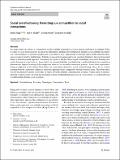Files in this item
Social overshadowing : revisiting cue-competition in social interactions
Item metadata
| dc.contributor.author | Telga, Maïka | |
| dc.contributor.author | Alcalá, José A | |
| dc.contributor.author | Heyes, Cecilia | |
| dc.contributor.author | Urcelay, Gonzalo P | |
| dc.date.accessioned | 2023-01-09T16:30:31Z | |
| dc.date.available | 2023-01-09T16:30:31Z | |
| dc.date.issued | 2023-01-05 | |
| dc.identifier | 282830345 | |
| dc.identifier | 777f0eb5-e763-4bb2-add5-6c3e672fa8e3 | |
| dc.identifier | 36604374 | |
| dc.identifier | 85145721537 | |
| dc.identifier | 000909438800001 | |
| dc.identifier.citation | Telga , M , Alcalá , J A , Heyes , C & Urcelay , G P 2023 , ' Social overshadowing : revisiting cue-competition in social interactions ' , Psychonomic Bulletin & Review . https://doi.org/10.3758/s13423-022-02229-3 | en |
| dc.identifier.issn | 1069-9384 | |
| dc.identifier.other | ORCID: /0000-0002-6792-0093/work/126031995 | |
| dc.identifier.uri | https://hdl.handle.net/10023/26724 | |
| dc.description | Funding: This research was supported by an Economic and Social Research Council grant (ES/R011494/2) awarded to Gonzalo P. Urcelay and conducted while Maïka Telga was visiting the University of Leicester from the University of Granada as an Honorary Fellow. | en |
| dc.description.abstract | In a large variety of contexts, it is essential to use the available information to extract patterns and behave accordingly. When it comes to social interactions for instance, the information gathered about interaction partners across multiple encounters (e.g., trustworthiness) is crucial in guiding one's own behavior (e.g., approach the trustworthy and avoid the untrustworthy), a process akin to trial-by-trial learning. Building on associative learning and social cognition literatures, the present research adopts a domain-general approach to learning and explores whether the principles underlying associative learning also govern learning in social contexts. In particular, we examined whether overshadowing, a well-established cue-competition phenomenon, impacts learning of the cooperative behaviors of unfamiliar interaction partners. Across three experiments using an adaptation of the iterated Trust Game, we consistently observed a 'social overshadowing' effect, that is, a better learning about the cooperative tendencies of partners presented alone compared to those presented in a pair. This robust effect was not modulated by gender stereotypes or beliefs about the internal communication dynamics within a pair of partners. Drawing on these results, we argue that examining domain-general learning processes in social contexts is a useful approach to understanding human social cognition. | |
| dc.format.extent | 11 | |
| dc.format.extent | 1073334 | |
| dc.language.iso | eng | |
| dc.relation.ispartof | Psychonomic Bulletin & Review | en |
| dc.subject | Overshadowing | en |
| dc.subject | Learning | en |
| dc.subject | Stereotypes | en |
| dc.subject | Cooperation | en |
| dc.subject | Trust | en |
| dc.subject | H Social Sciences (General) | en |
| dc.subject | DAS | en |
| dc.subject | MCC | en |
| dc.subject.lcc | H1 | en |
| dc.title | Social overshadowing : revisiting cue-competition in social interactions | en |
| dc.type | Journal article | en |
| dc.contributor.institution | University of St Andrews. School of Management | en |
| dc.identifier.doi | 10.3758/s13423-022-02229-3 | |
| dc.description.status | Peer reviewed | en |
This item appears in the following Collection(s)
Items in the St Andrews Research Repository are protected by copyright, with all rights reserved, unless otherwise indicated.

